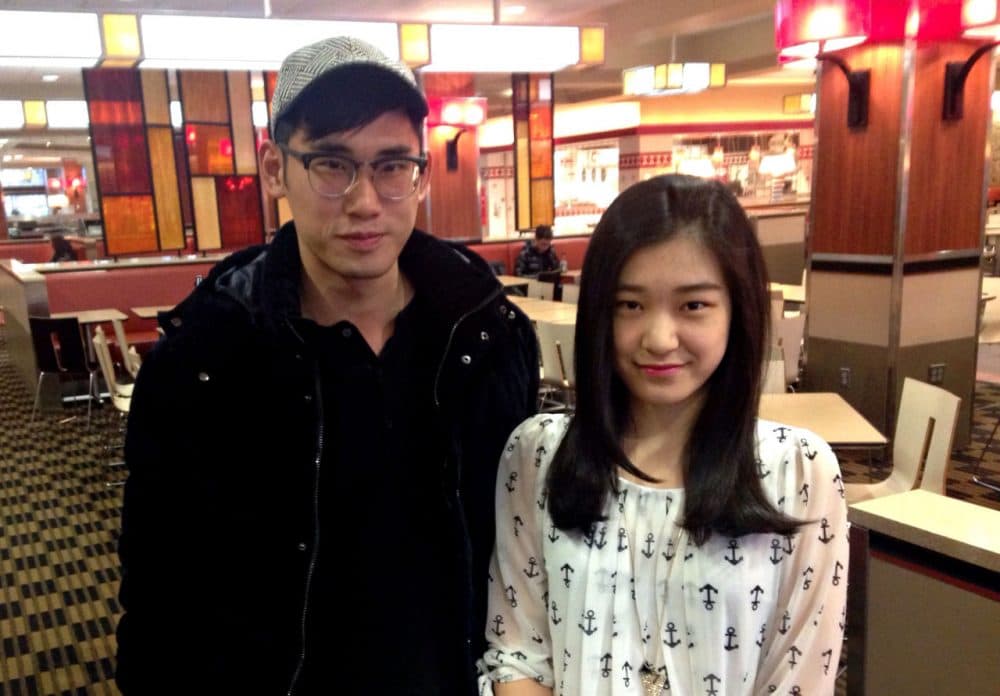Advertisement
U.S. Colleges, Hungry For Cash, Turn To Chinese Students Who Pay In Full
Resume
More than 300,000 Chinese college students studied in the United States last school year and pumped billions of dollars into the U.S. economy, according to the Institute of International Education.
The enrollment is almost double what it was five years ago, and it was a boon to colleges and universities in need of new revenue sources.
Marlon Li is part of the boom. He studies business at Boston University, and he was very young when his family in China started planning for his American college degree.
“It's a prestigious thing when you say you've studied abroad,” Marlon says. “People will be like, ‘Wow, that guy knows something.’”
Marlon is like many of the Chinese students studying in this country. He’s ambitious and smart. He’s also well off. Marlon’s father is a cancer surgeon and his mom owns a pharmaceutical company.
"It's a prestigious thing when you say you've studied abroad."
Marlon Li
“Boston University is not cheap, so you definitely have to come from a really wealthy family in order to study abroad,” he says.
Tuition, housing and fees at BU this year add up to $63,000 and almost all foreign students here pay full freight. Despite China’s slowing economy, the country’s middle class is now – for the first time – the largest in the world, according to Credit Suisse.
Many Chinese families have been saving up for years to send their only child to college in the United States, says Kelly Walter, BU’s vice president of admissions.
“I love meeting prospective students,” says Walter, whose office is decorated with Chinese gifts from her trips abroad.
A decade ago, Walter had never set foot in China. Now she goes on three recruiting trips a year. The work has paid off. Ten years ago, she says BU got 205 applications from China. This year, nearly 6,200 came in. Walter says the focus on foreign students is not about the money.
“That was not the rationale for this strategy,” she says. “It was about the experiences and the perspectives and the differences that these students would bring to enrich the campuses.”
At the University of California, it is a lot about the money. After adjusting for inflation, state funding to the U.C. system has dropped by more than $1 billion since 1999.
“So we are looking at different streams of revenue to the university than we’ve had in the past as the state has contributed less,” says Anne De Luca, Associate Vice Chancellor of Admissions and Enrollment at U.C. Berkeley.
A decade ago, 47 Chinese undergrads were enrolled at Berkeley - a number that has ballooned to more than 1,200 today, according to school data.
"...hanging out with my Chinese friends, we mostly speak Chinese. The only chance for me to speak English now is in the lecture."
Serena Xia
“We definitely have an expectation that they're going to pay the cost of their education,” De Luca adds.
But as enrollment surges, weaknesses are emerging.
“There are huge problems,” says Parke Muth, a Virgina-based education consultant who has been working with Chinese college students for years. “There are people that are coming in and their English is not good. Even if they wanted to, their ability to integrate themselves in the larger community is going to be difficult.”
Muth says American colleges and universities are now offering five-year programs, where the first year is dedicated to learning English.
There are other signals this balloon is falling back to earth. For three straight years, fewer Chinese students are applying to American grad programs, according to the Council of Graduate Schools
China's slowing economy could be to blame, or it might be China fighting to keep its talent at home.
China is investing billions of dollars every year in higher education and research. Muth says the country is building “state-of-art labs all over the place and they're quickly providing opportunities that students might not even find in many of the labs in the U.S.”
At Boston University, Serena Xia is settling into her first year as a communications student - a dream come true. She says she prefers the U.S. model of education. Her English is not flawless, but she says it’s good enough to get her through academically. Socially speaking, life is harder.
“My roommate is American and I try to hang out with her and talk more to her, but still I found it's difficult for me,” she says. “When I hanging out with my Chinese friends, we mostly speak Chinese. The only chance for me to speak English now is in the lecture.”
Note: WBUR's broadcast license is held by Boston University. Our newsroom operates independently.
Reporter
- Peter O'Dowd, assistant managing editor of Here & Now. He tweets @odowdpeter.
This segment aired on December 7, 2015.
